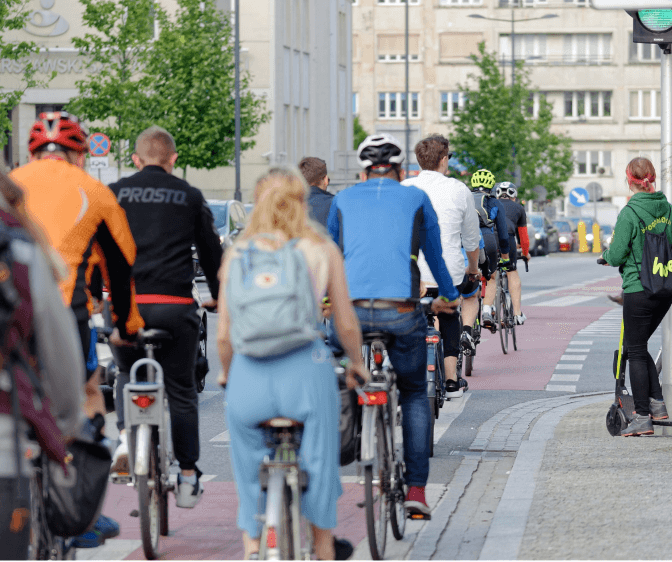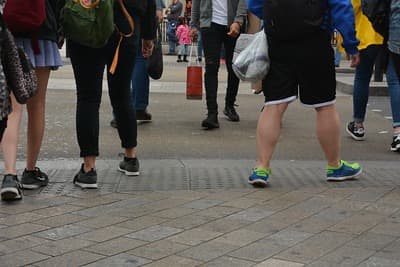
blog: Thinking smarter - what is the role of travel behaviour change in tackling the Climate Emergency?
Friday 27th March 2020
In May 2019 Parliament passed an extraordinary measure: a national declaration of an Environment and Climate Emergency. This decision marked a renewed sense of urgency in tackling climate change following on from the campaigns of Greta Thunberg and other activists, the broadcast of David Attenborough’s documentary Climate Change: The Facts and the related protests by environmental group Extinction Rebellion.
While there is no precise definition of what constitutes action to meet such an emergency, the move puts climate and the environment at the very centre of government policy. The UK is now legally committed to an 80% reduction in carbon emissions by 2050 (relative to their 1990 levels) and some city and local councils have set out their Climate Emergency policies to become carbon neutral by 2030.
To mitigate climate change, the number one goal is to replace fossil fuels with renewable energy sources and the road towards that transition includes daily decisions within our reach – like driving and flying less, switching to a ‘green’ energy provider and changing what we eat and buy. Of course, it’s true that climate change won’t be solved by our buying or driving habits alone but going car-free has been ranked by academics (Wynes and Nicholas, 2017) as the number-one most effective action individuals can take (except for not having kids!)

Previous blogs by the ITP team this month have referenced the scale of impact that Smarter Travel interventions can have in reducing car use.
For example, residential Personalised Travel Planning projects evaluated by ITP have achieved on average a 13-percentage point reduction in single occupancy car use for work trips.
On a wider scale, an analysis of the impact of the DfT’s Local Sustainable Transport Fund (LSTF) investment in infrastructure and travel behaviour change measures (Sloman et. al, 2017) showed a general decline in traffic volumes for a group of ‘Large Projects’ than for a comparator group of local authority areas during the same period. Adjusting for population growth, the group of Large Projects showed a fall in per capita car traffic between 2009-11 and 2015 of 2.6%.
Putting these findings into context, it has been estimated that for local councils to meet their 2030 carbon emission targets, the minimum level by which traffic volumes need to reduce is 20% depending on factors including the speed of the switch to electric vehicles and how fast the electricity powering them is decarbonised (Sloman and Hopkinson, 2018).
Smarter Travel interventions therefore have a significant role to play in influencing the required changes in travel behaviour towards more sustainable travel options but the evidence suggests that these techniques in isolation will not respond adequately enough to the challenge presented by the Climate Emergency unless combined with much more drastic solutions to reduce traffic levels, and specifically private car use.

With this goal in mind, some authorities are beginning to be more proactive in their forward planning. Proposals forming part of the draft Birmingham transport plan for example involve rerouting traffic to the ring road to make public transport, walking and cycling the preferred methods to travel in and out of the centre of the city. Under the plan, through trips by private cars would be completely banned with the removal of free parking and the reintroduction of cross city buses.
Other measures commonly cited by transport planners to achieve the desired effect in carbon reduction terms include managing the demand for travel by utilising fiscal measures including:
- Road pricing and Workplace Parking Levies
- Road-space reallocation policies
- Better coordination of planning objectives to reduce the need to travel
- The advancement of emerging innovations such as Mobility as a Service to integrate the transport service offer
- The introduction of regulatory targets to ensure businesses are responsible for the commuting traffic they generate
- The scaling-up of investment in non-car modes
To date Government policy has involved increased funding for new roads, building extra airport capacity, cutting funding for buses in real-terms, limiting spending on infrastructure supporting active travel modes and persisting with a deregulated planning system which promotes car based green-field development.
Government funding for travel behaviour change measures has also decreased significantly since the days of LSTF. In addition, some authorities are reluctant to set traffic reduction targets for the political reason of not wishing to seem anti-car, and for the practical reason that they may be happy to see an increase in travel by all means to locations where they are trying to encourage economic growth.
In summary, changing travel behaviour can be a key part of the strategy for success, with Smarter Travel interventions providing the means to facilitate a significant change by assisting local councils to encourage a shift in travel choices and habit adjustment. However without the political will to more effectively reduce our reliance on private car trips and to achieve a shift to increased patronage and participation in passenger and active transport, it remains to be seen whether we can truly meet our Climate Emergency targets in order to avoid the global warming outcomes predicted by the scientists.
For more information on our travel behaviour change work, please browse our website.
